June 10, 2016

Vaccine Is the Only One Approved in the U.S. for Protection Against Cholera
In a milestone that was years in the making, a vaccine to prevent cholera, invented and developed by researchers at the University of Maryland School of Medicine’s Center for Vaccine Development, was approved today by the U.S. Food and Drug Administration (FDA).
The vaccine, Vaxchora, is the only approved vaccine in the U.S. for protection against cholera. Its licensure allows for use in people traveling to regions in which cholera is common, including travelers, humanitarian aid workers, and the military.
PaxVax, a global biotechnology company based in California, received marketing approval from the FDA for Vaxchora, a single-dose oral, live attenuated cholera vaccine that is indicated for use in adults 18 to 64 years of age. Vaxchora is the only vaccine available in the U.S. for protection against cholera and the only single-dose vaccine for cholera currently licensed anywhere in the world.
The vaccine was invented in the 1980s at Center for Vaccine Development (CVD). Since 2009, CVD researchers have worked closely with PaxVax to develop the vaccine and secure FDA licensure approval.
 “This important FDA decision is the culmination of years of dedicated work by many researchers,” said Myron M. Levine, MD, DTPH, the Simon and Bessie Grollman Distinguished Professor at the University of Maryland School of Medicine (UM SOM). “For travelers to the many parts of the world where cholera transmission is occurring and poses a potential risk, this vaccine helps protect them from this disease. It is a wonderful example of how public-private partnerships can develop medicines from bench to bedside.” Dr. Levine is co-inventor of the vaccine, along with James B. Kaper, PhD, Professor and Chairman of the UM SOM Department of Microbiology and Immunology, and the senior associate dean for academic affairs at the school.
“This important FDA decision is the culmination of years of dedicated work by many researchers,” said Myron M. Levine, MD, DTPH, the Simon and Bessie Grollman Distinguished Professor at the University of Maryland School of Medicine (UM SOM). “For travelers to the many parts of the world where cholera transmission is occurring and poses a potential risk, this vaccine helps protect them from this disease. It is a wonderful example of how public-private partnerships can develop medicines from bench to bedside.” Dr. Levine is co-inventor of the vaccine, along with James B. Kaper, PhD, Professor and Chairman of the UM SOM Department of Microbiology and Immunology, and the senior associate dean for academic affairs at the school.
Cholera is an acute intestinal diarrheal infection acquired by ingesting contaminated food or water. Globally, cholera cases have increased steadily since 2005 and, millions of people are affected by this disease each year. Cholera can cause severe dehydration and death in less than 24 hours, if left untreated. While some cholera cases are rarely acquired in the U.S. from ingestion of uncooked seafood from the Gulf of Mexico, the vast majority of cases of domestic cholera cases occur in travelers to areas with epidemic or endemic cholera (for example, parts of Africa, Asia, or the Caribbean). A report from the U.S. Centers for Disease Control and Prevention suggests that the true number of cholera cases in the U.S. is at least 30 times higher than observed by national surveillance systems. The currently recommended intervention to prevent infection is to avoid contaminated water and food. But studies have shown that 98 percent of travelers do not follow these precautions.
 Vaxchora is expected to be commercially available later this year. The FDA approval is based on results from a phase 1 safety and immunogenicity trial, a phase 3 efficacy trial, and a phase 3 trial to test manufacturing consistency. The first two of these trials were led by Wilbur H. Chen, MD, MS, associate professor of medicine at UM SOM, and chief of the CVD’s Adult Clinical Studies section. The pivotal efficacy trial, which demonstrated protection from cholera of more than 90 percent at 10 days and 80 percent at 3 months after vaccination, is the first instance the FDA has based the decision to approve a product on a human experimental challenge model. Therefore, the licensure of Vaxchora marks a significant regulatory milestone. The most common adverse reactions to Vaxchora in the clinical trials were tiredness, headache, abdominal pain, nausea/vomiting, lack of appetite and diarrhea.
Vaxchora is expected to be commercially available later this year. The FDA approval is based on results from a phase 1 safety and immunogenicity trial, a phase 3 efficacy trial, and a phase 3 trial to test manufacturing consistency. The first two of these trials were led by Wilbur H. Chen, MD, MS, associate professor of medicine at UM SOM, and chief of the CVD’s Adult Clinical Studies section. The pivotal efficacy trial, which demonstrated protection from cholera of more than 90 percent at 10 days and 80 percent at 3 months after vaccination, is the first instance the FDA has based the decision to approve a product on a human experimental challenge model. Therefore, the licensure of Vaxchora marks a significant regulatory milestone. The most common adverse reactions to Vaxchora in the clinical trials were tiredness, headache, abdominal pain, nausea/vomiting, lack of appetite and diarrhea.
Cholera is chiefly a disease of poverty, poor sanitation, and lack of access to safe drinking water, so the global health burden of cholera rests on those populations residing in vulnerable developing countries. The World Health Organization estimates the burden of cholera to be between 1.4 and 4.3 million cases per year globally. Dr. Chen said that the next steps for this cholera vaccine are to explore formulations that could be developed into successful strategies to prevent and control cholera in countries where cholera is common. These future activities would involve immunizing young children in developing countries; this group has the highest risk of dying from cholera.
“The FDA approval of a new vaccine for a disease for which there has been no vaccine available is an extremely rare event. The approval of Vaxchora is an important milestone for PaxVax and we are proud to provide the only vaccine against cholera available in the U.S.,” said Nima Farzan, chief executive officer and president of PaxVax. “We worked closely with the FDA on the development of Vaxchora and credit the agency’s priority review program for accelerating the availability of this novel vaccine. In line with our social mission, we have also begun development programs focused on bringing this vaccine to additional populations such as children and people living in countries affected by cholera.”
“This approval is an excellent example of how our researchers are entering into public-private partnerships to help further science in tangible ways,” said UM SOM Dean E. Albert Reece, MD, PhD, MBA, who is also the vice president for Medical Affairs, University of Maryland, and the John Z. and Akiko K. Bowers Distinguished Professor. “This vaccine shows once again that work by scientists here has an impact not only nationally, but globally.”
About the University of Maryland School of Medicine
The University of Maryland School of Medicine was chartered in 1807 and is the first public medical school in the United States and continues today as an innovative leader in accelerating innovation and discovery in medicine. The School of Medicine is the founding school of the University of Maryland and is an integral part of the 11-campus University System of Maryland. Located on the University of Maryland’s Baltimore campus, the School of Medicine works closely with the University of Maryland Medical Center and Medical System to provide a research-intensive, academic and clinically based education. With 43 academic departments, centers and institutes and a faculty of more than 3,000 physicians and research scientists plus more than $400 million in extramural funding, the School is regarded as one of the leading biomedical research institutions in the U.S. with top-tier faculty and programs in cancer, brain science, surgery and transplantation, trauma and emergency medicine, vaccine development and human genomics, among other centers of excellence. The School is not only concerned with the health of the citizens of Maryland and the nation, but also has a global presence, with research and treatment facilities in more than 35 countries around the world. http://medschool.umaryland.edu/
About the Center for Vaccine Development
The Center for Vaccine Development (CVD) at the University of Maryland School of Medicine works nationally and internationally to prevent disease and save lives through the development and delivery of vaccines. As an academic research center, CVD is engaged in the full range of vaccinology, including basic science research, vaccine development, pre-clinical and clinical evaluation, and post-marketing field studies.
http://medschool.umaryland.edu/cvd/
About PaxVax
PaxVax develops, manufactures and commercializes innovative specialty vaccines against infectious diseases for traditionally overlooked markets such as travel. PaxVax has licensed vaccines for typhoid fever (Vivotif) and cholera (Vaxchora), and vaccines at various stages of research and clinical development for anthrax, HIV, hepatitis A and zika. As part of its social mission, PaxVax is also working to make its vaccines available to broader populations most affected by these diseases. PaxVax is headquartered in Redwood City, California and maintains research and development and Good Manufacturing Practice (GMP) facilities in San Diego, California and Bern, Switzerland and other operations in Bermuda and Europe. More information is available at www.PaxVax.com.
Contact
Office of Public Affairs
655 West Baltimore Street
Bressler Research Building 14-002
Baltimore, Maryland 21201-1559
Contact Media Relations
(410) 706-5260
Related stories
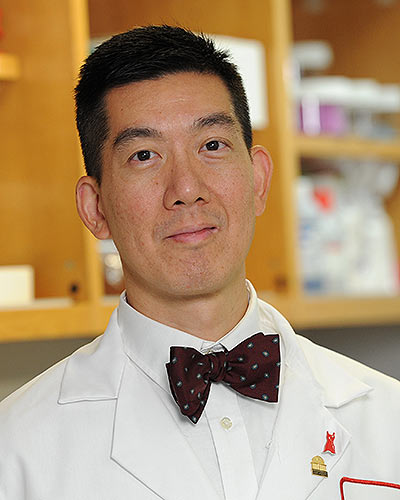
Wednesday, October 08, 2025
New Vaccine Shows Promise Against Typhoid and Invasive Salmonella in First Human Trial
Researchers at the University of Maryland School of Medicine’s Center for Vaccine Development and Global Health (CVD) have completed a successful Phase 1 clinical trial of a novel vaccine designed to protect against both typhoid fever and invasive non-typhoidal Salmonella--two major causes of illness and death among children in sub-Saharan Africa.

Wednesday, March 12, 2025
Meningococcal Vaccine Found to be Safe and Effective for Infants in Sub-Saharan Africa
University of Maryland School of Medicine (UMSOM) researchers helped conduct an important new global health study that found a vaccine that protects against five strains of meningitis prevalent in sub-Saharan Africa is safe and effective for use in young children beginning at 9 months of age. This study provided evidence that formed the basis for the World Health Organization’s (WHO) decision last year to recommend the pentavalent Men5CV meningitis vaccine for infants ages 9 months and older.
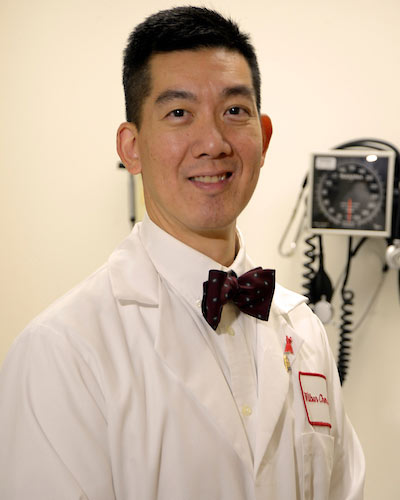
Monday, October 02, 2023
UM School of Medicine Researchers Present Interim Results on Meningococcal Vaccine for Infants and Young Children in Africa
University of Maryland School of Medicine (UMSOM) researchers, as part of the Infectious Diseases Clinical Research Consortium (IDCRC), provided an interim analysis showing that the pentavalent (NmCV-5) meningitis vaccine is safe for use in 9-month-old infants in the meningitis belt of sub-Saharan Africa. They presented their results to the World Health Organization’s (WHO) Strategic Advisory Group of Experts (SAGE) on Immunization on September 26.
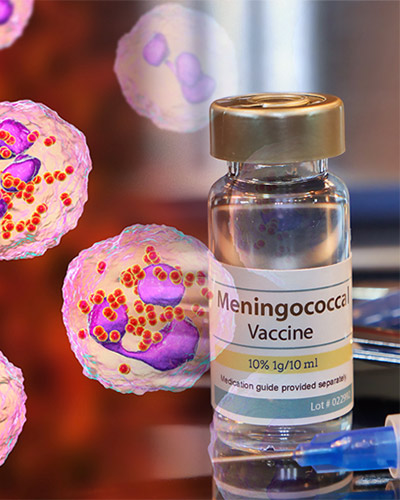
Thursday, March 24, 2022
UM School of Medicine Leads Research to Assess Meningococcal Vaccine for Infants and Young Children in Africa
Researchers at the University of Maryland School of Medicine (UMSOM)’s Center for Vaccine Development & Global Health (CVD) are leading a study to evaluate the use of a pentavalent – or five in one – meningococcal conjugate vaccine (NmCV-5) among infants and young children in the meningitis belt of sub-Saharan Africa. This is the final and pivotal study for World Health Organization (WHO) prequalification of this vaccine, which is the last stage to make the vaccine available for low- and middle-income countries.

Wednesday, January 27, 2021
Dr. Wilbur Chen, Nationally-Recognized Vaccine Researcher, Selected for Federal Committee that Guides Immunization Policies
Wilbur H. Chen, MD, MS, FIDSA, FACP, Professor of Medicine at the University of Maryland School of Medicine (UMSOM), has been named a new voting member of the federal government’s Advisory Committee on Immunization Practices (ACIP), the prestigious board of experts that makes recommendations on the safe use of vaccines for Americans. The U.S. Department of Health and Human Services selected Dr. Chen for the 15-member advisory committee based on his expertise and national leadership in vaccinology, infectious diseases, public health, and preventive medicine. He will remain in his current role at UMSOM while he serves in his four-year term, which began last month.
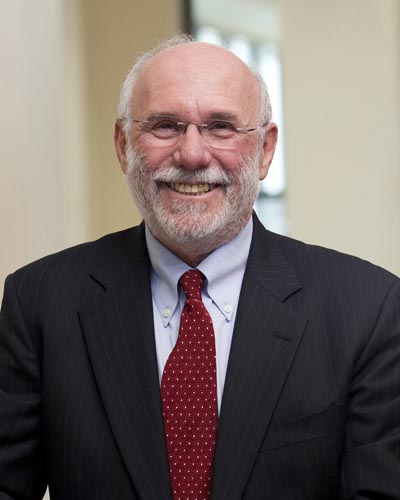
Thursday, January 09, 2020
UM School of Medicine Research Shows Less Severe Cases of Diarrheal Illness can Still Lead to Child Deaths, Even Weeks Following Onset of the Illness
Diarrheal diseases are a leading cause of death for young children, accounting for nine percent of all deaths worldwide in children under five years of age, with most occurring in children under two years of age. Now, researchers at the University of Maryland School of Medicine (UMSOM) found that even milder cases of diarrheal diseases can lead to death in young children.

Tuesday, December 10, 2019
UMSOM Researchers to Test Vaccine Designed to Protect Against Serious Illness from Contaminated Food and Water
Each year, millions of people contract serious diarrheal illnesses typically from contaminated food and water. Among the biggest causes of diarrheal diseases are the bacteria Shigella and enterotoxigenic Escherichia coli (ETEC), and researchers at the University of Maryland School of Medicine are testing a vaccine designed to offer protection against these serious pathogens.

Wednesday, October 30, 2019
UM School of Medicine's Myron M. Levine, MD, DTPH, to Receive Prestigious Lifetime Award for Five Decades of Pioneering Vaccine Research
Myron M. Levine, MD, DTPH, the Simon and Bessie Grollman Distinguished Professor at the University of Maryland School of Medicine (UMSOM), Associate Dean for Global Health, Vaccinology and Infectious Diseases, and Founder and Former Director of the Center for Vaccine Development and Global Health (CVD) is a co-recipient of the 2020 Research! America Geoffrey Beene Foundation Builders of Science Award for his pioneering vaccine and infectious disease research.
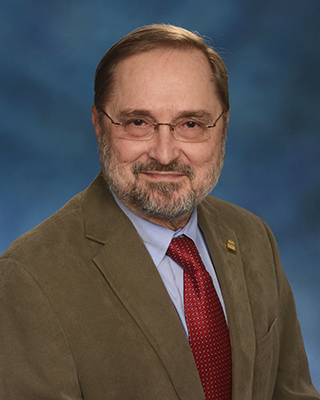
Monday, July 01, 2019
James Kaper Receives Prestigious American Society for Microbiology D.C. White Mentoring Award
James B. Kaper, PhD, the James and Carolyn Frenkil Distinguished Dean’s Professor Vice Dean for Academic Affairs and Professor and Chairman of the Department of Microbiology & Immunology at the University of Maryland School of Medicine (UMSOM), received the 2019 American Society of Microbiology (ASM) D.C. White Award for his accomplishments in interdisciplinary research and mentoring in microbiology.
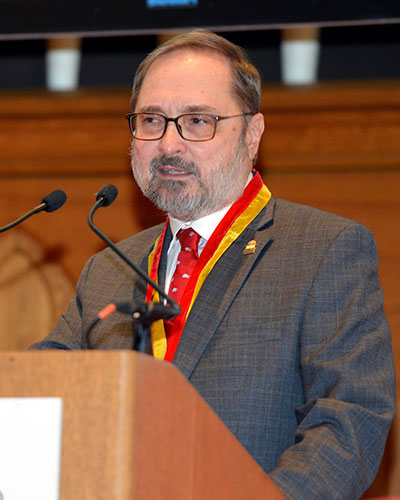
Wednesday, January 16, 2019
James B. Kaper, PhD, Endowed as James and Carolyn Frenkil Distinguished Dean's Professor
James B. Kaper, PhD, Professor and Chair of the Department of Microbiology & Immunology and Vice Dean for Academic Affairs, was invested as the James & Carolyn Frenkil Distinguished Dean’s Professor on January 10 before a packed audience at Westminster Hall. Surrounded by family, friends, past and present colleagues and distinguished scientists, Dr. Kaper joined the elite group of 82 SOM faculty who currently hold endowed professorships, the highest honor bestowed by the SOM on individual faculty members.
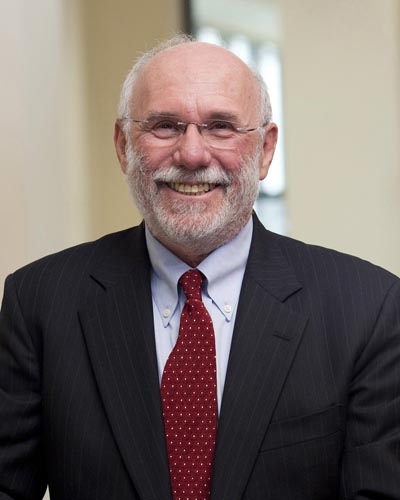
Thursday, December 20, 2018
Data From Largest Global Diarrheal Disease Study Available to Scientists on Public Sites
Data collected from the Global Enteric Multicenter Study (GEMS), a multi-site research project studying diarrheal diseases that was designed and coordinated by researchers in the Center for Vaccine Development and Global Health (CVD) at the University of Maryland School of Medicine (UMSOM), are now available to scientists on two online data resources.
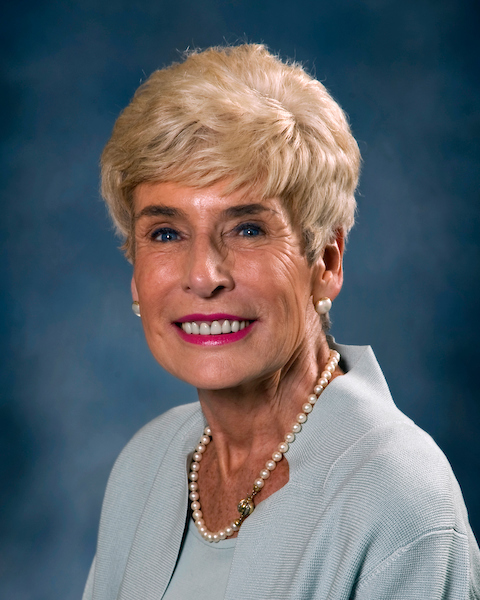
Tuesday, July 31, 2018
University of Maryland School of Medicine Establishes Two Endowed Professorships Through Private Gifts and Matching State Funds
University of Maryland School of Medicine (UMSOM) Dean E. Albert Reece, MD, PhD, MBA, announced today that the school has been awarded matching funds from the Maryland E-Nnovation Initiative Fund (MEIF), administered by the Maryland Department of Commerce. The funds, when combined with private philanthropy, will enable UMSOM to establish two new endowed professorships – one in Microbiology and Immunology, and one in Pharmacology.

Tuesday, March 20, 2018
UMSOM Vaccine Experts Lead Trial on Avian Flu Vaccine
Vaccine experts at the University of Maryland School of Medicine (UMSOM) have begun multiple clinical trials of vaccines designed to protect against H7N9, an avian influenza virus that was first reported in humans in 2013 in China.
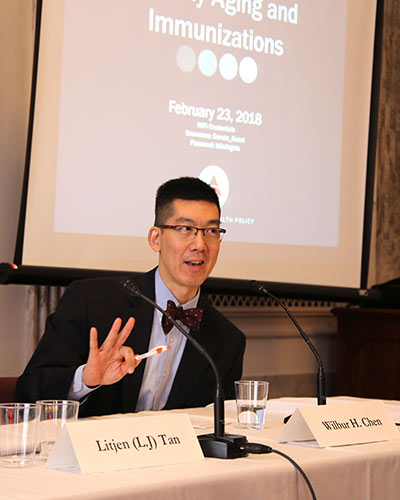
Friday, February 23, 2018
University of Maryland School of Medicine Vaccine Expert Highlights Need for Vaccination Among Older Adults During Capitol Hill Briefing
Today at a briefing on Capitol Hill, Wilbur Chen, MD, MS, Associate Professor of Medicine at the University of Maryland School of Medicine, warned that the U.S. population of adults 65 and older is expected to rise significantly over the next few decades, making vaccinations against diseases like influenza, pneumonia and shingles for this population very critical.

Monday, December 11, 2017
High-Dose Cholera Vaccine Developed by UMSOM Scientists Shows Promise for Controlling Outbreaks
Each year there are more than three million cases of cholera worldwide, a disease transmitted through contaminated food and water that hits developing countries particularly hard. While the standard regimen for protecting against cholera with existing non-living oral cholera vaccines includes administering two doses over a two-week period, research at the University of Maryland School of Medicine (UMSOM) now shows that giving a stronger single-dose of a live oral vaccine could be an effective tool in controlling outbreaks more quickly.
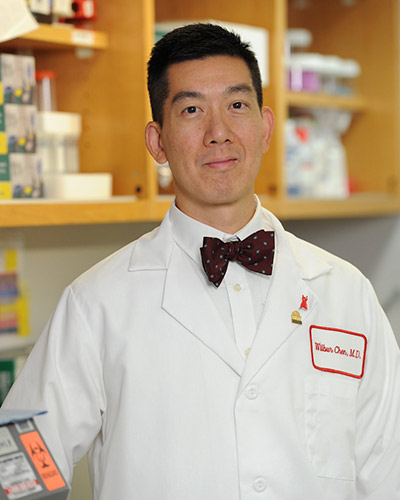
Wednesday, October 11, 2017
UM SOM Scientist Elected as Fellow of Infectious Disease Society of America
Wilbur Chen, MD, MS, Associate Professor of Medicine at the University of Maryland School of Medicine (UM SOM), was elected as a Fellow by the Board of Directors of the Infectious Disease Society of America (IDSA). Fellowship in IDSA is a top honor for those who have achieved professional excellence and have provided significant service as an infectious disease physician and scientist.

Thursday, August 03, 2017
UM SOM Received $2.47 Million Grant To Develop Traveler's Diarrhea Vaccine
The University of Maryland School of Medicine (UM SOM) has been awarded a three-year, $2.47 million grant from the National Institute of Allergy and Infectious Diseases to develop a vaccine to protect against Shigella and Enterotoxigenic Escherichia coli (ETEC), pathogens which are among the leading causes of diarrheal disease in young children in developing countries and a common cause of “traveler’s diarrhea” among travelers to these countries.

Thursday, June 08, 2017
University of Maryland School of Medicine Vaccine Researcher Receives Top Award in the Study of Infectious Diseases from National Foundation
Myron M. Levine, MD, DTPH, the Simon and Bessie Grollman Distinguished Professor and Associate Dean for Global Health, Vaccinology and Infectious Disease at UM SOM, has been awarded the Maxwell Finland Award for Scientific Achievement by the National Foundation for Infectious Diseases (NFID).

Monday, May 15, 2017
U.S. CDC Recommends Use of Cholera Vaccine Developed by University of Maryland School of Medicine
A cholera vaccine developed by scientists at the University of Maryland School of Medicine’s Center for Vaccine Development (CVD) has been recommended by the U.S. Centers for Disease Control and Prevention (CDC) for use as a protection for U.S. adults traveling to areas with cholera. The CDC’s latest recommendation was published on May 11, in Morbidity and Mortality Weekly Report.

Monday, May 15, 2017
UM SOM Vaccine Researcher Receives Top Award in the Study of Infectious Diseases
Myron M. Levine, MD, DTPH, the Simon and Bessie Grollman Distinguished Professor and Associate Dean for Global Health, Vaccinology and Infectious Disease at UM SOM, has been awarded the Maxwell Finland Award for Scientific Achievement by the National Foundation for Infectious Diseases (NFID). The award honors his extensive accomplishments in public health; over his career, he has identified solutions to major sources of disease in the developing world, including cholera, typhoid, and Shigella dysentery. The award will be presented on Thursday, May 18, 2017 at the Hyatt Regency Bethesda in Bethesda, Md.
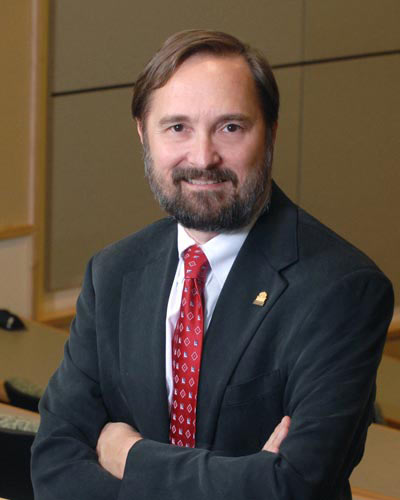
Tuesday, January 17, 2017
Special Issue of Pathogens and Disease Highlights Innovative Research by Scientists at the University of Maryland School of Medicine in Collaboration with UM School of Dentistry
New research by scientists at the University of Maryland School of Medicine (UM SOM) and the University of Maryland School of Dentistry (UM SOD), is highlighted in a special issue of Pathogens and Disease.

Friday, December 23, 2016
Trial Results Confirm Ebola Vaccine Provides High Protection Against Disease
An experimental Ebola vaccine was highly protective against the deadly virus in a major trial in Guinea, according to a new study that included researchers from the University of Maryland School of Medicine (UM SOM).
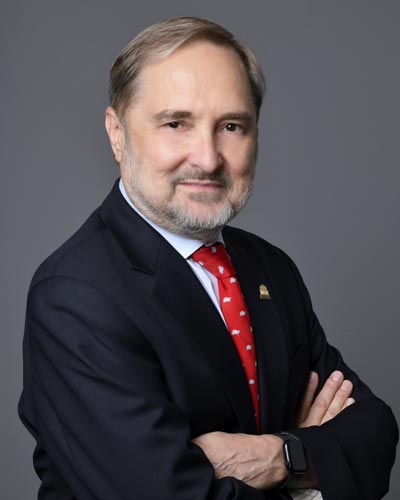
Tuesday, October 04, 2016
UM SOM Launches Unprecedented Initiatives to Create New Generation of Research Scientists Among Students, Trainees and Faculty
New and expanded research development programs at the University of Maryland School of Medicine will include focus on developing junior, minority and female faculty investigators as well as students and trainees.
